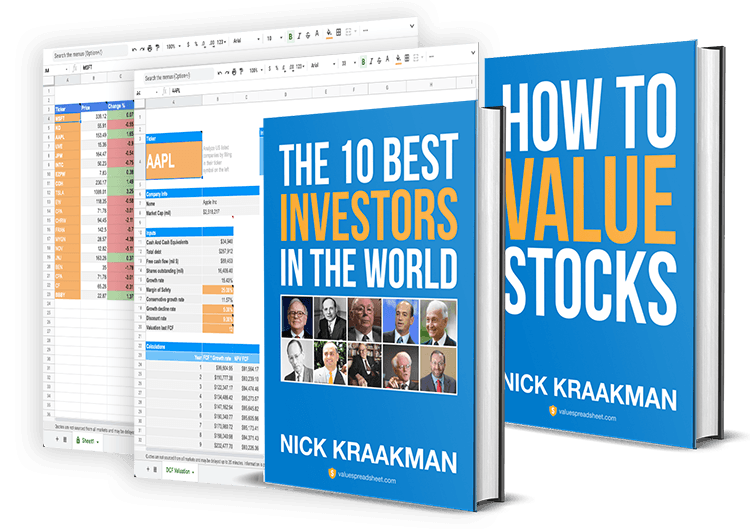Transcript
Hello, welcome back to the value investing bootcamp podcast.
I'm your host, Nick Kraakman, founder of valuespreadsheet.com, and today we have some interesting stuff to cover, some important stuff to cover, namely setting realistic investment goals.
Why is this important?
Well, because if you have unrealistic goals, you might get tempted to take unreasonable risks, and therefore losing your hard earned savings.
So what is realistic then?
Well, it is important to know first that not many people actually earn a living on the stock market, it is more a way to grow the money you already own.
I mean, even if you have, let's say $100,000 to invest, and you take the average stock market return, the average historical stock market returns, which is 10%, or something around that number.
This means that per year you would earn only $10,000, which is not nearly enough to live off, I mean, at least not in most western countries it is, and not many people have $100,000 to invest.
If you do, that is great, of course, but then still it is very difficult to earn a living from that.
So, keep that in mind just to manage your expectations a bit.
Also, your focus should be on reducing risk, minimizing risk rather than focusing on returns, because even a small loss of money is very hard to earn back.
For example, if you lose 10%, it will take you 11% to earn that loss back.
If you lose 50%, on the other hand, it will take you 100% to earn it back.
I mean, if you have $1,000 and you lose 50%, you'll be left with $500, and in order to earn back that $500 that you lost, you need to earn 100%.
So, it's really really hard to earn money back, and this also interrupts the compounding process we discussed earlier in a previous episode.
Einstein called it the Eighth Wonder of the World, compounding interest, so interest upon interest, which makes your money grow faster and faster over time.
If you lose money, you actually interrupt this process, and that's a shame, because that's the most powerful tool value investors have.
For example, Warren Buffett, he had the following to say about this. He said: "Rule number one is to never lose money. Rule number two is to never forget rule number one."
That's how important he believes loss avoidance is.
So, realistic goals are important, and it is important to avoid losses at all cost.
Another thing that is really, really important is to think about why you want to invest in the first place.
What is the goal of your investments? Are you saving for retirement? Are you trying to get your kids through college? Are you planning to buy a new car with it?
I mean, those all play a big role, and they determine the timeframe of your investments, and as we discussed before, a long time frame is necessary in order for value investing to work.
So, if you need the money, if you expect to double your money in a year, then this strategy is not for you.
Value investing takes a lot of discipline and patience and hard work, and if you think that this is an easy way to become a millionaire, then you're wrong.
It could make you a millionaire, but it will take a lot of time.
So, yeah, that's another thing, don't invest with money that you need in the short term.
If you invest with a couple thousand dollars which you actually need in two years time to pay for your daughter's college tuition, then that's probably not a good idea.
Of course, by that time, you could have made a nice profit, but it could also be the case that your stock is still underpriced, and this means you are forced to sell at a suboptimal time.
Always try to sell when you want, not when you have to, and the best way to do this is to never invest with money that you need, and also never invest with money that you borrowed, because it's just so dumb to do that.
Sorry for the word dumb, but I mean, investing with money that is not your own... of course it can make you a lot of extra profits, but if it goes wrong, it goes wrong catastrophically, and it's just not worth the risk.
So, don't ever do that.
Yeah, so setting realistic goals, one way is to just go through a couple of steps in your head.
For example, how much money do you plan to invest? And then look at how much money do you actually need to achieve the goal?
The goal is the reason why you invest.
How much money do you need? When do you consider yourself successful?
Then you can calculate, okay, so what is my timeframe? And then how much money do you need to earn on your investments each year? What percentage return are you looking at, that is required in order for you to make it to your goal in time?
If this is way above the historical market average of 10% a year, so to achieve your goal, you need to earn 50% a year, this is really unrealistic, because the historical market return is just 10%.
And yes, value investing thing allows you to earn above average returns, so you can earn way more than that 10%, but still, 50% is very unrealistic.
In this case, you should either invest more money, or find other sources of income, because you're just not going to make that amount of money with your current investment.
And talking about investing money, many people always wonder, okay, if I want to get started with investing, how much money should I invest at the bare minimum? What is the bare minimum?
Well, in my first episode I told you my story of how I got started, and how transaction costs just ruined my profits, because I invested with such a small amount of money.
That's really one of the major reasons why you need at least, I’d say, I mean, you could probably start with $500, but I would say the bare minimum is $1,000, just because if you manage to earn 10% or 20%, you're still left with a nice amount of money.
The transaction costs will still eat a lot of that profit away, but at least you're left with some money, you know.
So, I'd say that $1,000 is a reasonable amount.
Then after that, once you have put in the initial amount of money, I always suggest to people to automatically invest 10% of their monthly income, or at least transfer 10% of their monthly income to their brokerage account at the beginning of each month, and invest that money eventually.
So, why automatically and why the beginning of the month? Well, because if you don't do it automatically, you'll forget it sometimes, and if you don't do it at the beginning of the month, you'll probably have spent that money by the time the end of the month arrives.
At least that's what happens to most people.
So, just to protect yourself from yourself, just set up an automatic transfer of a certain amount of money to your brokerage account each month, and this way, even though small amounts, they add up and the benefit is that, this way you don't risk your, or don't put your entire life savings on the line, but just this small amount.
Okay, well, that was it for today.
Thank you very much for listening again, I hope that you're enjoying it so far.
This is the very first podcast I’ve ever produced, so it's new for me as well.
I think it's going all right.
I hope you learn a thing or two from it, and please spread the word and leave me a message if you like it or have a question.
Thanks and have a great day!
If you enjoyed today's show, head over to ValueInvestingBootcamp.com to find out more on how you can invest like the pros, manage your own portfolio with confidence, and consistently earn mind boggling returns on the stock market.



